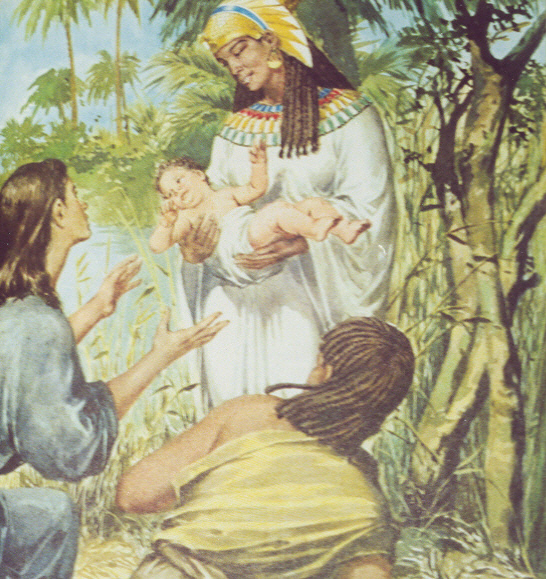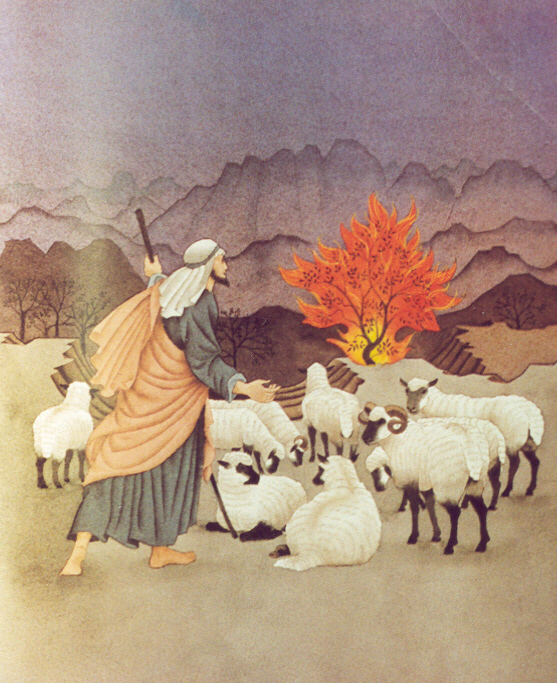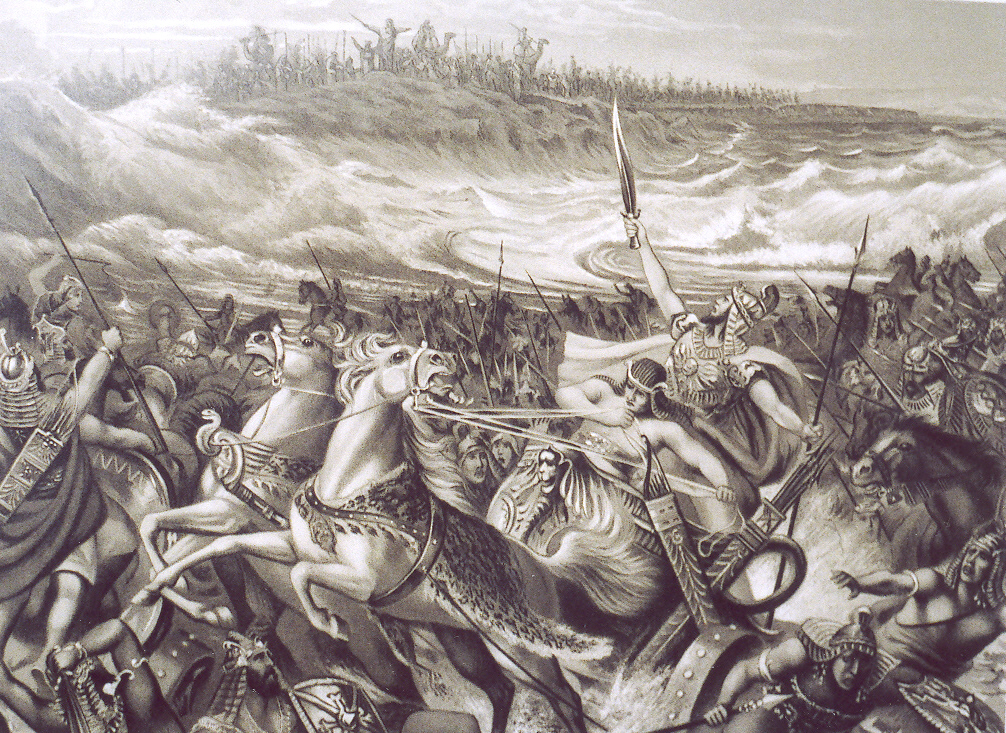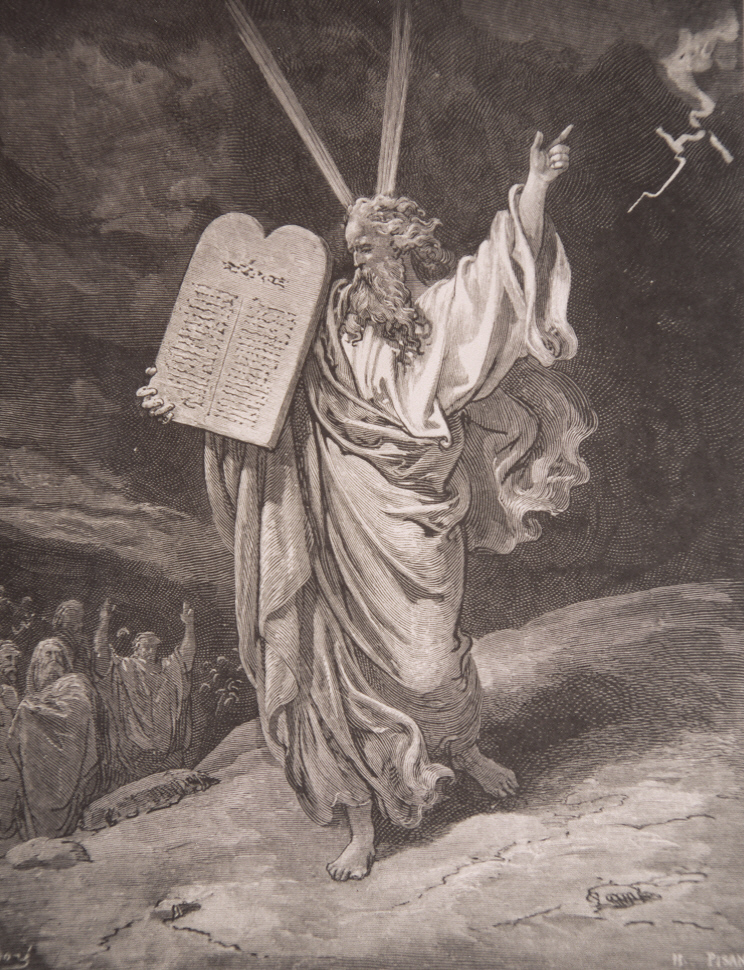
Return to
Index The Catholic Faith
Return to
Level Three Topic Index
Home Page
Before the coming of Jesus, the Redeemer, the most important person among God's chosen people was Moses, the first of God's prophets. He was their first leader, and he helped to make the Israelites a united people.

Moses was born in Egypt to a poor Israelite woman. At the time of his birth the Pharaoh had made a law that required the death of every newborn Israelite boy. He did this because the Jewish people were becoming a very large group, and if their numbers continued to increase they would not as easily be kept in slavery. Hoping to save the life of her son, Moses' mother hid him in a basket by the Nile River.
One day, the Pharaoh's daughter found little Moses, and she adopted him as her own son. He grew up in the royal palace and was treated as one of the family. Moses knew that he was really an Israelite by birth, and he would visit the Jewish slaves often. During one of these visits he saw an Egyptian hit one of the slaves; this filled him with so much anger that he killed the Egyptian! Realizing that he was in great trouble for having killed the Egyptian, Moses fled Egypt and went to the land of Midian. Here he became a herdsman, married a woman named Zipporah, and raised a family.
God Calls Moses

The time soon arrived when God, because of the covenant he had made with Abraham, Isaac, and Jacob, answered the prayers of his enslaved people. He appeared to Moses in an burning bush and told him to return to Egypt in order to deliver the Jews from their slavery. The Lord said to Moses: I have witnessed the affliction of my people in Egypt and have heard their cry of complaint against their slave drivers, so I know well that they are suffering. . . Come now! I will send you to Pharaoh to lead my people, the Israelites, out of Egypt. . . I will be with you; and this shall be your proof that it is I who sent you: when you bring my people out of Egypt, you will worship God on this very mountain (Ex 3:7, 10-12).
At this time God also revealed his name to Moses. He called himself Yahweh which translated means, "I AM". This tells us that God is the source of all that exists; it is he alone who has the power to do all things. It also reminds us that God is eternal; that is, his existence had no beginning and will have no end.
Moses Returns to the Land of Egypt
Obeying the will of God, Moses traveled to Egypt where he was accepted by the Israelites as a prophet sent from the Lord. He chose his brother, Aaron, to be his companion in God's service and they both went to Pharaoh with this message: "Thus says the Lord, the God of Israel: Let my people go . . ." (Ex 4:1).
But the Pharaoh would not think of it! Instead he increased the labor of the Jews and treated them even more harshly. In order to punish his stubborness God sent ten plagues upon the land: water turned into blood; frogs overran the countryside; gnats, flies, and a thick dust filled the air; animals died; hailstorms descended upon the land; locusts destroyed their crops; and for three days all of Egypt was plunged into darkness. Even after all of these terrible signs, Pharaoh refused to obey the will of God in letting the Jewish people go!
The Passover of the Lord
Before sending the tenth and final plague (which was to be the death of every first-born Egyptian son and animal), God told Moses to have each Israelite family hold a special religious meal which would be a sign that they were members of his sacred people. Every family was to kill a lamb and eat it with unleavened bread and bitter herbs. They were to eat this holy meal standing, ready to leave on a journey. Before finishing this ceremony, they were to sprinkle the lamb's blood on their wooden doorposts, for this would be a signal that the home was to be spared from the tenth plague. When the angel of death went throughout the land carrying out this plague, he would pass over the homes of God's people. Thus the meal became known as the Passover. Even today, Jewish families gather together to celebrate the feast of the Passover; it is always celebrated near our Christian feast of Easter.
The Passover meal was a special preparation of God's people for Christ's saving death and for the Mass, which is the sacred sacrifice-meal of the new chosen people, the Church. Let us pause to compare these important events.
The Israelites gathered together for the Passover by the command of God; we Catholics come together every Sunday for Mass as Christ commands us. During their ceremony the Israelites sacrificed an animal known as the Paschal lamb; we offer the Father the Eucharistic sacrifice of Jesus, who is the "Lamb of God" (Jn 1:36). At the Passover meal the Israelites are the sacrificed lamb; at every Eucharist we are invited to partake of the Body and Blood of Jesus in Holy Communion. The Israelites sprinkled the blood of the sacrificed lamb upon the wood of their doorposts so that death would not come to them that night; at every Holy Mass the precious blood of Jesus is sacramentally shed for our sins so that we might be saved from eternal death (Hell). Finally, because of the Passover ceremony and the tenth plague, the Israelites were freed from their slavery; because of Christ's sacrifice we are freed from slavery to sin and the devil.
Because these sacred ceremonies are so similar, the liturgy of the Church for Holy Week and Easter calls the Crucifixion and the Resurrection the "Paschal Mystery" (Passover) of the Lord Jesus. Saint Paul, in his first letter to the Corinthians, uses this same comparison saying: "Christ, our Passover has been sacrificed. Let us celebrate this feast.. . with the unleavened bread of sincerity and truth" (5:7-8).
The Exodus from Egypt

Afraid of the power of the Israelites' God, Pharaoh let the Jews leave Egypt. We call this journey from Egypt to the promised Land the Exodus. Soon after they had left the Pharaoh's city, the Egyptian ruler changed his mind and sent some of his troops to bring the Israelites back. At first God's people were terrified at seeing the soldiers coming toward them, but Moses told them to trust in the Lord. As the Israelites approached the Red Sea, God intervened to save them: the mighty waters parted and there was a clear path for them to travel through! The soldiers came galloping after the Israelites, but they were too late: as soon as the last of God's people reached the other side of the sea, the waves came crashing down upon the Egyptians. You can imaging the great joy and confidence in God that filled the hearts of his people!
Even with this great sign of God's protection, the people soon grew weary of traveling in the desert where food and water were scarce. They complained to Moses: "Would that we had died by the hand of the Lord in the land of Egypt. . . But you had to lead us into this desert to make the whole community die of famine!" (Ex 16:3).
Seeking God's comfort and strength, Moses went up a mountain where he prayed to the Lord. In reply, God sent nourishment to his people in miraculous ways: he gave them a special bread called manna and water gushed forth from a rock! This bread, wondrously sent from God, prefigures the Holy Eucharist, which is the heavenly Bread of Life.
God Gives Moses the Ten Commandments

After about three months of wandering in the desert the Israelites found themselves at Mount Sinai. Moses climbed up this mountain in order to be alone for prayer. At this time God appeared to him and gave him the Ten Commandments, also called the Law. In the meantime the people grew weary again and complained about their situation. Many of them actually turned their backs on God saying to Aaron: "Come, make us a god who will be our leader" (Ex 32:1).
They melted down all their gold jewelry and formed an idol, or image of a false god, in the shape of a calf. They worshipped this image, committing the sin known as idolatry. When Moses came down from Sinai he grew furious at this sin of the people. How dare they turn their backs on the one true God, the God who had made a covenant with their ancestors and who had so miraculously freed them from slavery! Moses destroyed the idol and those who had worshipped it were punished. The Israelites told God and Moses that they were sorry for having doubted. They promised to do whatever was asked of them in order to remain God's chosen people. Moses returned to Sinai in order to seek God's wisdom in this matter.
God Renews the Covenant with His People
God told Moses to give this message to the people: "Here, then," said the Lord, "is the covenant I will make. Before the eyes of all your people I will work such marvels as have never been wrought in any nation anywhere on earth. . . But you, on your part, must keep the commandments I am giving you today" (Ex 34:10-11).
So Moses proclaimed the Ten Commandments to the people and they all answered: "We will do everything that the Lord has told us" (Ex 24:3).
From that day on the Commandments of the Law became the people's way of showing their loyalty to God. They considered themselves good Jews so long as they kept the Law. The had such a deep respect for the Commandments that they built a special container, called the Ark of the Covenant, in which the tablets of the Law were kept. They carried this with them as they journeyed to the Promised Land.
God Commands Sacrifices
As another part of the renewed covenant, God commanded that the priests of Israel offer animal sacrifices to him in worship. A sacrifice is the act of offering to God something that is precious to us. These gifts were to be offered on an altar that was consecrated, set apart solely for this purpose. Each time a sacrifice was offered, the people would be reminded of the covenant and of their duty to obey the Law. During each sacrifice the priests would beg God to forgive the sins of all the people.
For the next few centuries of salvation history (until the perfect sacrificial death of Jesus on the Cross), these sacrifices were offered to God by the Jewish people. Thus sacrificial worship became an important religious event in the lives of the People of God.
The Israelites Enter the Promised Land
After forty years of traveling through the desert the people finally arrived in the Promised Land. However, Moses was forbidden by the Lord to enter this land because he had once doubted God's power. Even though he was a holy man and a prophet, he had to endure this punishment because he disobeyed God's command. This shows that even one sin is "one too many" in God's eyes. Moses died just as the people were nearing the land. After burying him, the Israelites entered into the land promised them from of old: the land God said he would give to Abraham, Isaac, and Jacob.
Joshua and the Judges of Israel
Joshua was Moses' successor as prophet of God and leader of the people. He was also a great warrior who led the Jews in battle against the foreigners who had taken over their land while they had been enslaved in Egypt. The book of Joshua in the Old Testament tells us about this brave man and the way he served God. Before his death, Joshua gathered the Israelites together and renewed the covenant with the Lord.
After Joshua's death there was a new kind of leadership for Israel: the judges. These were not men who presided over courts of law as our judges do; they were military heroes who won great victories for God's people. The era of judges lasted only as long as Israel needed military men to reconquer their land. Once the community was firmly established as a nation, the work of the judges ended, and yet another new form of leadership arose: the kings.
The Rule of the Kings
At this time in salvation history there lived a holy prophet named Samuel. Since the Israelites wanted a king like all the other nations, God told Samuel to anoint certain men as the kings of God's people. He chose a man named Saul to be the very first king of Israel. Samuel anointed Saul king by pouring oil over his head as a sign that he had been chosen by God. Saul proved to be an unworthy king and he soon died.
His successor was David, a shepherd boy who won a might battle with the Philistine soldier Goliath. David became the greatest king Israel ever had; he was a strong warrior and a good government leader. Even though he committed some terrible sins, he was truly sorry for them, and God forgave him. He loved God and wrote some beautiful prayers and hymns to him. We call these the Psalms, and even today they are used in worship. It was King David who made Jerusalem the capital of the Jewish nation and the center of their worship. God loved David and made a special promise to him: one of his descendants would reign as king for ever! This was a prophecy about Jesus, who was a descendant of David and the true King of the Jews.
After David's death, his son Solomon became king. He was a very wise ruler who made the kingdom a good place in which to live. His words of advice were written down and can be found in some of the wisdom books of the Old Testament. Solomon had a magnificent temple built in Jerusalem; it was beautifully decorated inside with gold, fine cloth, and ornate furnishings.
Soon after Solomon's death, however, the kingdom experienced many difficulties. The Jews who lived in the northern part fought with those of the south; they eventually divided the cherished Promised Land into two separate nations. The northern kingdom was called Israel, while the southern kingdom was named Judah. It was the kingdom of Judah that remained faithful to God and to King David's policies. And it was from the people of this nation that Jesus Christ would come to us.
Used with the permission of The Ignatius Press 800-799-5534
Return to
Index The Catholic Faith
Return to
Level Three Topic Index
Top
Home Page